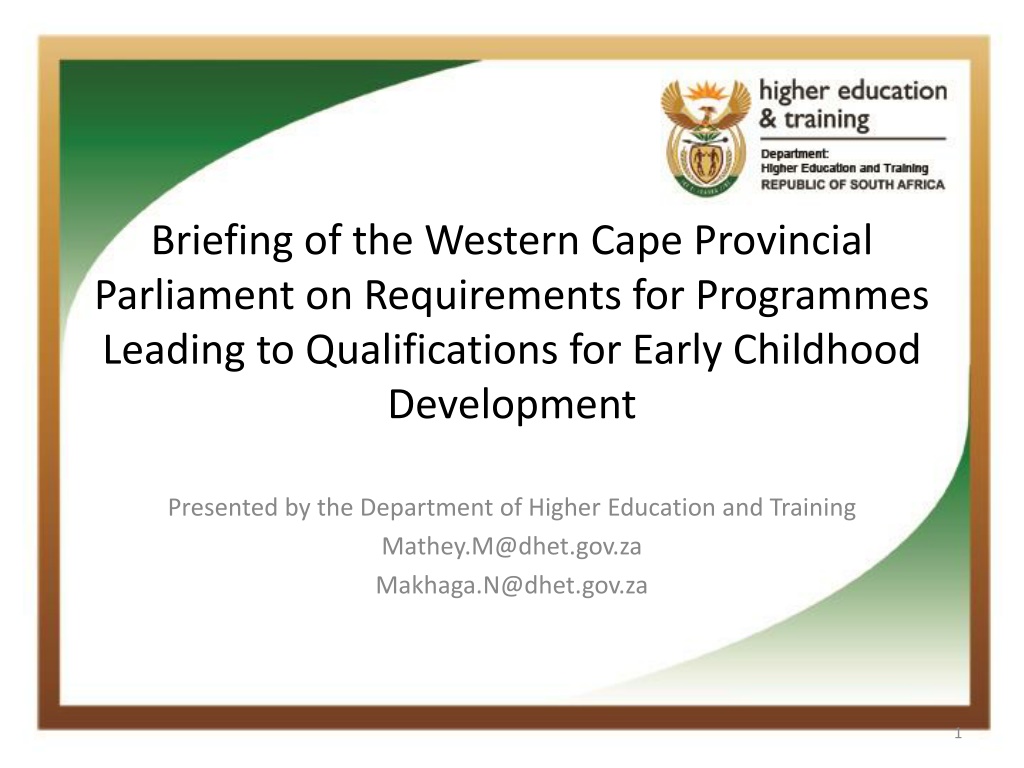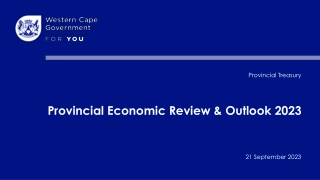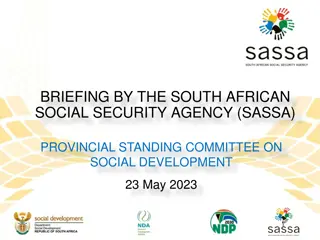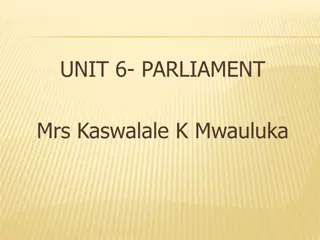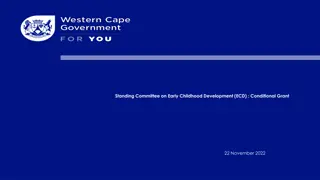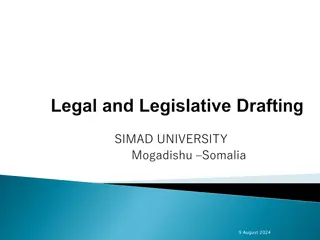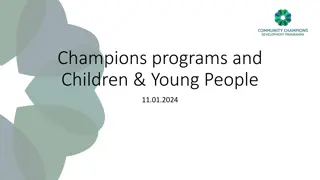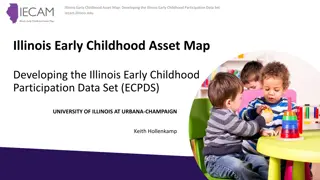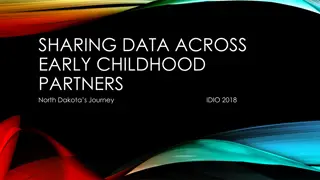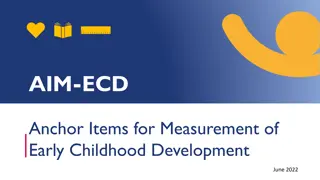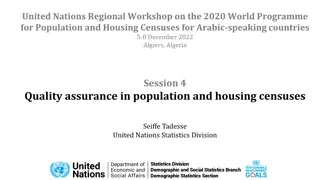Early Childhood Development Programmes in Western Cape Provincial Parliament
Importance of Early Childhood Education and relevant Acts and Policies were discussed in the briefing at the Western Cape Provincial Parliament. The presentation emphasized the vital role of ECD in developing foundational skills and the need for professionalization of ECD practitioners. It also highlighted the National Qualifications Framework and the policy on minimum requirements for programmes leading to qualifications in higher education for ECD levels.
- Early Childhood Education
- Western Cape
- ECD Practitioners
- National Qualifications Framework
- Higher Education
Download Presentation

Please find below an Image/Link to download the presentation.
The content on the website is provided AS IS for your information and personal use only. It may not be sold, licensed, or shared on other websites without obtaining consent from the author. Download presentation by click this link. If you encounter any issues during the download, it is possible that the publisher has removed the file from their server.
E N D
Presentation Transcript
Briefing of the Western Cape Provincial Parliament on Requirements for Programmes Leading to Qualifications for Early Childhood Development Presented by the Department of Higher Education and Training Mathey.M@dhet.gov.za Makhaga.N@dhet.gov.za 1
Outline of the Presentation 1. 2. 3. 4. 5. Importance of Early Childhood Education Relevant Acts and Policies National Qualifications Framework Professionalisation of ECD Practitioners Policy on Minimum Requirements for Programme Leading to Qualifications in Higher Education for ECD Levels and Minimum Admission Requirements at Higher Education Institutions Approval and Accreditation of new programmes 6. 7. 2
Importance of Early Childhood Education Early childhood education is vital in the early years of learning and it involves: The transfer of foundational skills and competencies for later lifelong learning The process of emotional, cognitive, sensory, spiritual, moral, physical, social development of children from birth to school-going age Government policies and programmes have been developed, recognising the need for, and benefits investing in ECD and communication 3
Relevant Acts and Policies The Constitution of the RSA Higher Education Act, 1997 (Act No. 101 of 1997) National Qualifications Framework Act, 2008 (Act No. 67 of 2008) National Qualifications Framework Higher Education Qualifications Sub-Framework, 2013 Occupational Qualifications Sub-Framework, 2022 Policy on Minimum Requirements for Programme Leading to Qualifications in Higher Education for ECD, 2017 4
National Qualifications Framework National Qualifications Framework Level Sub-Framework and qualification types 10 Doctoral Degree (360 Credits) Doctoral Degree (Professional * 9 Master s Degree (180 Credits) Master s Degree (Professional) * 8 Bachelor Honours Degree (120 Credits) Postgraduate Diploma (120 Credits) Bachelor s Degree (480 Credits) Specialised Occupational Diploma (120 Credits) ECD Qual on the HEQSF ECD historical /current Qual on the OQSF 7 Bachelor s Degree (360 Credits) Advanced Diploma (120 Credits) Advanced Occupational Diploma (120 Credits) 6 Diploma (360 credits) Advanced Certificate (120 Credits) Occupational Diploma (360 Credits) Advanced Occupational Certificate (120 Credits) 5 Higher Certificate (120 Credits) Higher Occupational Certificate (120 Credits) 4 National Certificate (120 Credits) National Occupational Certificate (120 Credits) 3 Intermediate Certificate Intermediate Occupational Certificate (120 Credits) 2 Elementary Certificate Elementary Occupational Certificate (120 Credits) 1 General Certificate General Occupational Certificate (120 Credits) 5
Professionalisation of ECD Practitioners Historical and Current ECD Qualifications Articulation into Professional Qualifications (e.g. National Certificate: ECD: Pre-school Phase, QCTO National Diploma; EDTP SETA Certificates in ECD) All current practitioners qualifications articulate into the qualifications as outlined in the Policy on Minimum Requirements for Programme Leading to Qualifications in Higher Education for ECD 6
Policy on Minimum Requirements for Programme Leading to Qualifications in Higher Education for ECD 7
ECCE POLICY CONTEXT Policy on Minimum Requirements for Programmes leading to Qualifications in Education White Paper on Early Childhood education National Integrated Early Childhood Dev. Policy (NIECD) 2015 White Paper on Education & The National Early Learning The National Curriculum Framework for children National Dev. Plan : Higher Education Children s Act, for Early Dev. Vision 2030 Training Act 38 Standards Childhood (2012) (Birth to 4) 1995 of 2005 2009 2001 Development Educators 2017 8
Purpose and Scope of the Policy on Minimum Requirements for Programme Leading to Qualifications in Higher Education for ECD Puts in place a set of qualifications for ECD educators who are delivering or assisting in delivering ECD programmes This policy is based on the HEQSF, and is subject to it and any revisions of the HEQSF Puts in place qualifications programmes for prospective and existing ECD educator The policy is aimed at ensuring that higher education system in offering these qualifications, contributes to initial professional and CPD in ECD educators 9
Purpose and scope of the policy cont.. The policy follows a nested approach: Selects suitable qualification types from the HEQSF for ECD educators; identifies suitable qualifies and as such identifies purpose of the programme leading to a qualification Describes knowledge mix that is appropriate for the programme Sets minimum credits values for programmes in terms of knowledge mix at different levels Provide the NQF Levels for each qualification types described in the policy 10
The End Users of the Policy HEIs to develop programmes for ECD educators DHET to determine whether proposed programmes submitted by Universities confirm to policy (DHET evaluates the programme) for approval for funding and inclusion in the PQM DHET to evaluate programmes submitted by private HEIs for registration with DHET, enabling them to offer the programme CHE s HEQC for accreditation and quality assurance processes Used by appropriate professional bodies in their determination of qualification requirements for professional registration Used by employers of ECD educators 11
Policy on Minimum Requirements for Programmes Leading to Qualifications in Higher Education for Early Childhood Development Educators (MRQEECCE) Qualifications are not appropriate for teaching in the schooling sector must not be used for this purpose . May apply for credit recognition and complete recognised qualification for employment as a teacher in schools Embraces a spirit of openness and inclusivity, and seeks to enable articulation and access rather than constraint and exclusion Basis for construction of core curricula for programmes leading to initial professional and post professional qualifications for ECD educators 19 ECD educator competences in MRQEECCE
Levels and Minimum Admission Requirements at Higher Education Institutions 13
Levels available - Articulation Pathways NQF Level Certificates Diplomas Degrees 10 Doctorate 9 Master s Degree Professional Master s Degree 8 Post-Graduate Diploma in Early Childhood Care and Education Bachelor of Education Honours in Early Childhood Care and Education 7 Advanced Diploma in Early Childhood Care and Education Bachelor of Education in Early Childhood Care and Education 6 Advanced Certificate in Early Childhood Care and Education Diploma in Early Childhood Care and Education 5 Higher Certificate in Early Childhood Care and Education 14
Articulation between ECCE professional programmes NQF Exit level Certificates Degrees Diplomas Doctorate 10 Professional Doctorate Masters 9 Professional Masters Post Grad Diploma in ECCE (Post professional qualification) Advanced Diploma in ECCE (Post professional qualification) Diploma in ECCE (Initial Professional Qualification ) 8 Bachelor of Education Honours(PG Degrees) Bachelor of Education inECCE (Initial Professional Qualification) 7 6 Advanced Certificate in ECCE (Post professional qualification) Higher Certificate in ECCE (Entry Level) 5 15
Higher Certificate in ECCE ( 120 credits; 120 NQF Level 5) Higher Certificate in ECCE ( 120 credits; 120 NQF Level 5) Purpose Entry level/ introductory (access) Entry level/ introductory (access) qualifications to the study of ECD education in a higher education and training context and will qualify graduates as educators. A National Senior Certificate (NSC), or a Level 4 National Certificate (Vocational), or an appropriate Level 4 Certificate in ECD. Diploma ECCE or B Ed ECCE Minimum Admission Requirements Progression Basic introductory knowledge, cognitive and conceptual tools and practical techniques. Must be able to apply beginner knowledge and competence. Work integrated learning : minimum of 6 weeks. Students to be cleared in terms of Children s Act, ACT 38 OF 2005 Proficient in the use of at least one official South African language as LoLT Partially proficient (basic conversation) in at least one other SA language All must have conversational competence in one African language Sign language may be developed as a language of conversation competence 16
Diploma in ECCE (120 credits; NQF Level 6) Diploma in ECCE (120 credits; NQF Level 6) Initial Professional qualification Purpose Minimum Admission Requirements A NSC or a Level 4 NCV with a diploma entry endorsement or equivalent. A Level 4 occupational or vocational certificate in ECD can also be considered for admission, and a Level 5 certificate or diploma can be considered for admission and assessment for advanced credit standing. Progression Advanced Dip ECCE or B Ed ECCE. In-depth specialisation of knowledge , practical skills ad experience Professionally competent educators; WIL : 18 weeks - 24 weeks;
Bachelor of Education in ECCE (480 credits, NQF Level 7) Bachelor of Education in ECCE (480 credits, NQF Level 7) Purpose Initial professional qualification Minimum Admission Requirements A NSC or Level 4 NCV, with endorsement for entry into Bachelor studies, or equivalent. Level 4 or 5 vocational and occupational qualifications, including a certificate or diploma in ECD/Educare. Transfer of credit into the B ED Advanced Dip ECCE or B Ed Honours or cognate PG Dip ECCE Progression Develop cognately with Dip for ease of articulation from Dip to B Ed; Well rounded education - required disciplinary knowledge, educational theory and methodology;
Recognition of Prior Learning and Credit Accumulation Transfer Recognition of Prior Learning and Credit Accumulation Transfer Learning outcomes not to be compromised Takes place on an individual student by student basis Involves an assessment /professional judgement of prior learning To be conducted by the admitting university in accordance with national policies, quality council policies and institutional policies 1. SAQA(2013) : National policy for implementation of the recognition of prior learning 2. CHE RPL policy 3. Recognition of prior learning Coordination Policy (2016) Incomplete qualification : 100% credits Complete qualification : 50% Only 10% of a cohort can be RPL d and be admitted in a particular year 19
Approval and Accreditation of New Programmes Leading to the Qualifications Described in the Policy Programmes leading to a specific professional qualification for ECD educators must be designed in accordance with the minimum requirements for the qualification, as set out in this policy document. Learning programmes must also comply with all the accreditation criteria and requirements of the HEQC of the CHE. New professional ECD educator qualification programmes offered by public HEIs must comply with this Policy for approval by the DHET, for inclusion on a particular institution s PQM and for recognition for employment in posts where the state is the employer. New professional ECD educator qualification programmes offered by private HEIs must comply with this Policy for approval by the DHET as part of the requirements to be met for the institution to be registered with the DHET as an accredited provider of the programmes, and for recognition of the qualification for employment, where applicable, in posts where the state is the employer. 20
Thank You Presented by Michelle Mathey and Neil Makhaga Mathey.M@dhet.gov.za Tel No: (012) 312 5162 Makhaga.N@dhet.gov.za - Tel no: (012) 312 5101 21
